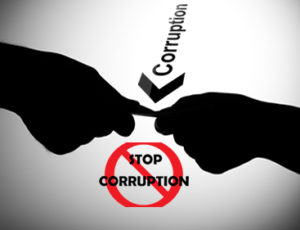Corruption is a major obstacle to development – GenCED
 Corruption has been identified as one of the major obstacles to development, which requires institutional reform rather than police investigations.
Corruption has been identified as one of the major obstacles to development, which requires institutional reform rather than police investigations.
Miss Ester Tawia, the Director of Gender Centre for Empowering Development (GenCED), said to tackle corruption effectively there was the need to use a preventive approach, which would be less divisive and a threat to high-level government officials.
At a forum on corruption dialogue in Accra, jointly organised by GenCED and the Political Science Department of the University of Ghana, Miss Tawia said Ghana’s problems with corruption had become almost an epidemic in the last decade, with negative effects on the citizens, especially women’s development.
Miss Tawiah said corruption had a negative effect on eradicating poverty and enhancing equality among the population.
Provisions of various instruments including the UN Sustainable Development Goal 16, the Africa Governance Architecture and Ghana’s 1992 Constitution focus on peace, justice, and the building of strong institutions to fight against corruption to achieve good governance.
Dr Maame Adwoa A. Gyekye-Jandoh, a Lecturer at the Political Science Department of the University of Ghana, speaking on the topic; “Fighting Corruption to Increase Women’s Participation in Governance,” noted that the increasing feminization of poverty where 70 per cent of the 1.8 billion persons living in poverty globally were women, meant that women were less likely to have the wherewithal to bribe officials in high places with huge sums of money.
She said the financing of political parties and elections bred corruption, and that such phenomenon put off many women from seeking political office.
She said women faced sexual harassment or solicitation of sexual favours in exchange for promotions and political positions, as well as financial support and contracts, which were all forms of corruption.
“Another dimension of this subtle corruption, in the words of one female politician, is that every woman in public office is perceived to have gotten there through the provision of sexual favours… whereas women have to work twice as hard as men to get even one position.
“The selection process of the parties militates against women’s running for political office.
“In one major party, a female MP recounted facing a lot of internal opposition, where even getting people to help in the campaign was a drag, and there was no extra funding or logistics for the women candidates,” Dr Gyekye-Jandoh said.
She recommended that gender-sensitive anti-corruption legislation and policies must be put in place to deal with physical abuse, sexual extortion or exploitation, and other forms of bribery.
The capacity of institutions involved in combating corruption, including personnel and logistics, she suggested, must be built and laws punishing sexual harassment, violence, and exploitation enforced to deter that kind of corruption.
Dr Gyekye-Jandoh reiterated that the Right to Information Bill needed to be passed to allow Ghanaians and institutions to access the necessary information on public service delivery and assets declaration.
Source: GNA
